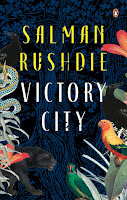It’s untidy. Like the India in which it is set. Characters, each of whom deserves a novel himself/ herself, drift in and out. All the causes worth fighting about, in this strange, beautiful country of ours, find their space - gender, caste, religion, class, Kashmir. All the major political events in the last three decades are there in some form or the other. Like I said before, it’s a complete unholy mess. Like watching the world in Krishna’s mouth.
It works, though. Because somehow, in spite of the overwhelming political backdrop, Arundhati Roy does what she does best. Makes you care about the small people - the boy Aftab who becomes a girl Anjum, my favourite character in the book; the IB officer Biplab Dasgupta, on the wrong side of the war in Kashmir; Gulrez, the old, simple Kashmiri, who is killed and paraded as a dreaded militant; Dayachand, aka Saddam Hussein, the lower caste boy who sees his father lynched by upper caste Hindus as he clears a dead cow’s carcass; Azad Bharathiya Guru, on permanent fast in Jantar Mantar; Maoist Revathy, raped and tortured, and yet writing to the world from her grave.
The small people stand tall amongst the ruins. They make the fight worth fighting. They are the redeemers, the salvation of a world gone horribly wrong. They make the book.
My least favourite character was Tilo - an amalgamation of Rahel and Ammu from GOST and Arundhati herself. It’s a rehashed character and feels like it. But she is the conduit to another beautiful character - Kashmir.
Yes, Kashmir is a character by itself. Roy has some exquisite passages describing its beauty amongst the rubble of a self-destructive war. It’s a long death spiral we cannot look away from - and it forms some of the most powerful parts of the book.
The Ministry of Utmost Happiness is a great read. It is also an important one as it conflates some of our country’s biggest issues into fiction. Is it great fiction? Yes, the agenda could have been better framed. The pulpit could have been better disguised. But then, would it have been an authentic Arundhati Roy? And can anyone ask for anything more than an authentic Arundhati Roy - conscience-keeper, rebel, wordsmith, a god of small things?



